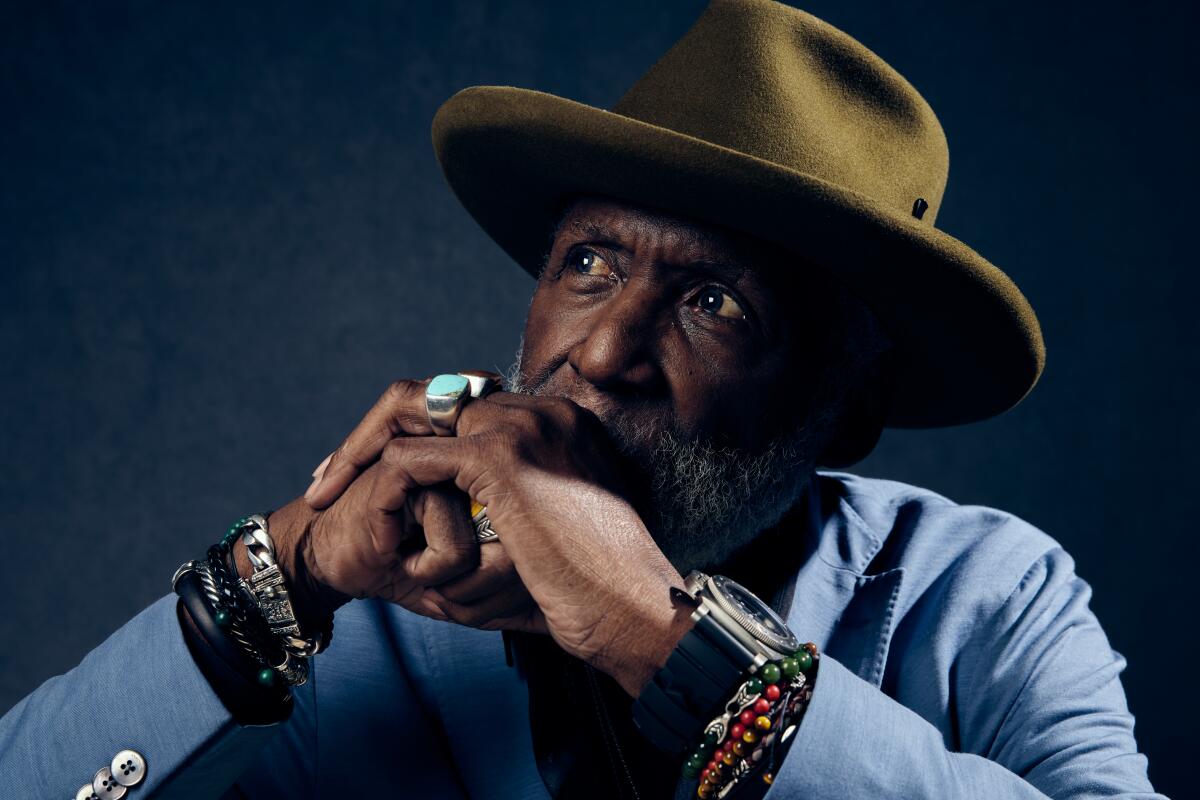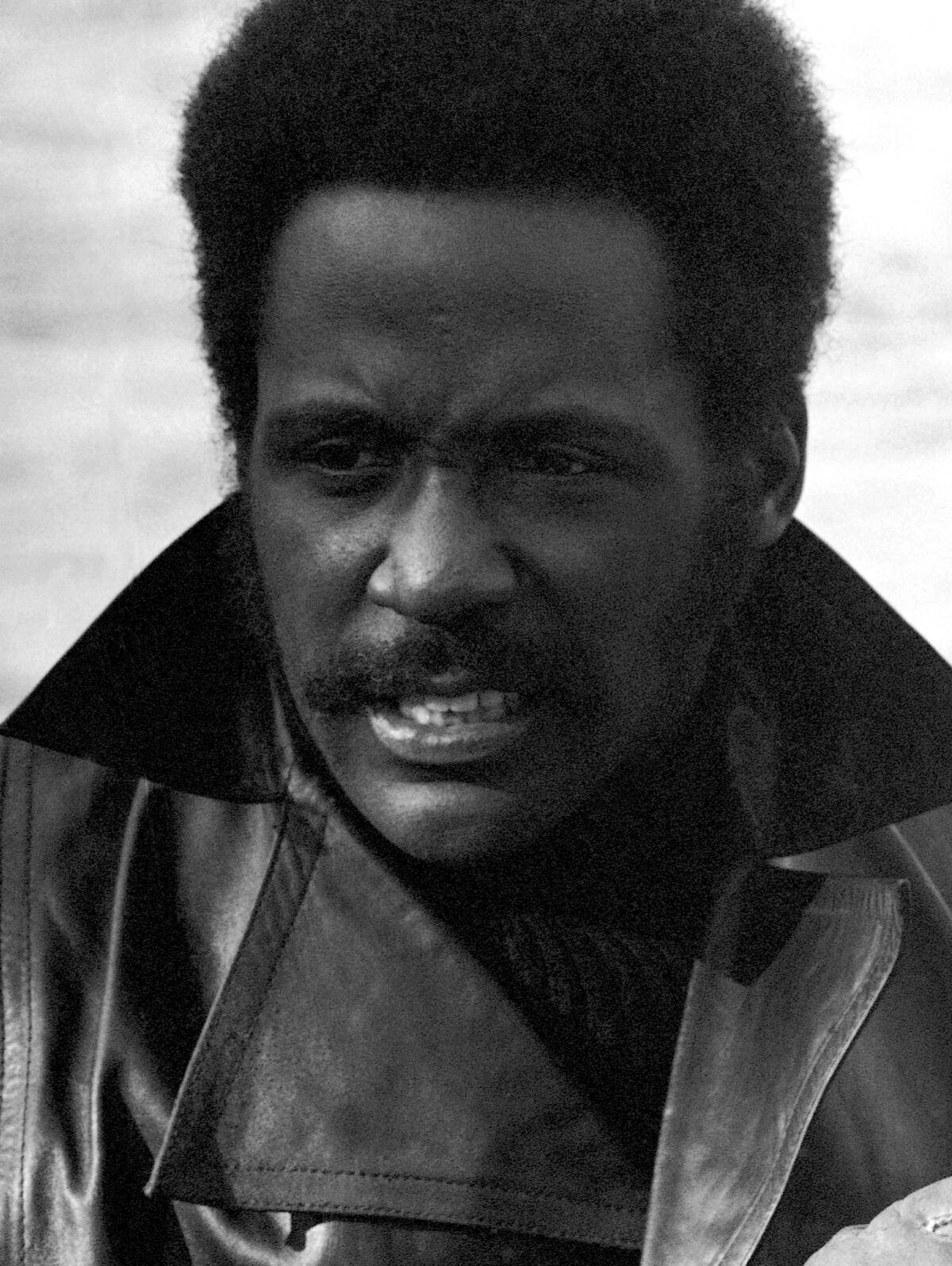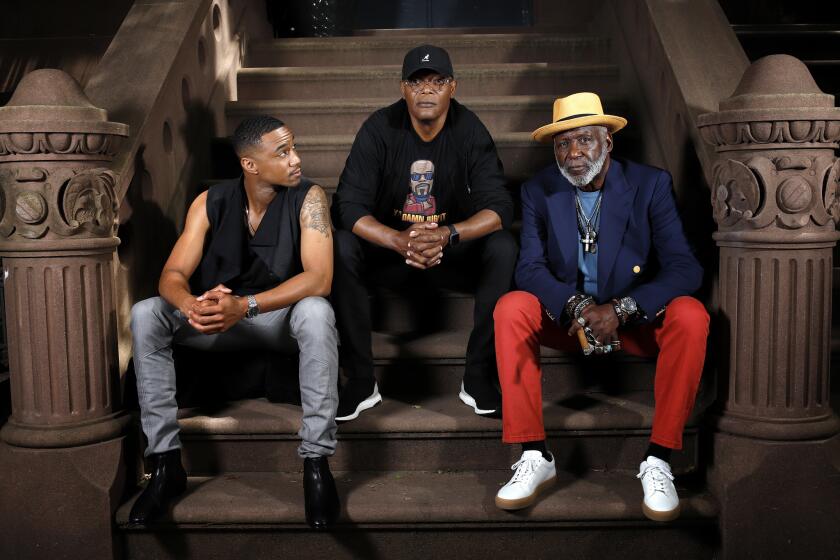Richard Roundtree, star of the 1970s ‘Shaft’ film franchise, has died at 81

- Share via
Richard Roundtree lent his velvet voice and cool cat stride to one of the most influential action heroes of the 1970s. Who is the man that would risk his neck for his brother man? “Shaft” — Can you dig it? Roundtree’s status as a cultural icon lived on and carried the actor through a five-decade Hollywood career encompassing more than 150 movie and television appearances.
Roundtree died Tuesday after a brief battle with pancreatic cancer. He was 81.
His longtime manager, Patrick McMinn, and his agency, Artists & Representatives, confirmed the star’s death in statements to The Times.
“Artists & Representatives Agency mourns the loss of our friend and client Richard Roundtree. His trailblazing career changed the face of entertainment around the globe and his enduring legacy will be felt for generations to come,” the agency’s statement reads. “Our hearts are with his family and loved ones during this difficult time.”
Often heralded as the first Black action hero, Roundtree shot to superstardom with his portrayal of private eye and smooth-talking lady’s man John Shaft in director Gordon Parks’ 1971 action thriller. “Shaft” was adapted by Ernest Tidyman and John D.F. Black from Tidyman’s novel. Roundtree also starred in the 1972 sequel “Shaft’s Big Score!” and 1973’s “Shaft in Africa,” as well as the 1973 “Shaft” television spinoff series.
“It put me on the map, number one,” Roundtree told Dateline of the role in 1999. “It has afforded me a long career because I’ve been cast largely in authoritative roles, which is a good thing,”
The star told The Times in 2019 that he could still recall the interview with director Parks that took his career from modeling for the Ebony Fashion Fair to being the guy everyone wanted to be. “I was sitting in his office and he’s saying, ‘We’re kind of looking for a guy who looks like this,’” said Roundtree. “And I look over, and it’s an ad that I had done. ‘That’s me!’”

Roundtree’s casting in “Shaft” relied on his obvious swagger, but according to Parks, it was his mustache that sealed the deal. Parks admitted he almost fired Roundtree and told him a strong ’stache was crucial in creating a Black hero who could compete with James Bond and Steve McQueen. “The day before we started shooting in New York, Joel Freeman, my line producer, told Richard to go cut his mustache off,” Parks said in the 2022 Criterion Collection featurette “Revisiting Shaft.”
“I saw Richard walking across the floor with a razor and I said, ‘Don’t take too much of the mustache off, Richard.’ He said, ‘I was going to take it all off.’ I said, ‘You wouldn’t have a job if you did.’
“The romantic hero part, the mustache, you’ll be delighted to know, it was the first mustache put on a Black hero on film ever,” Parks said.
Richard Arnold Roundtree was born on July 9, 1942, to John and Kathryn Roundtree in New Rochelle, N.Y. Roundtree played football at New Rochelle High School, graduating in 1961, and earned an athletic scholarship to Southern Illinois University.
After dropping out of college, Roundtree worked as a model for Ebony, moved back to New York and joined the Negro Ensemble Company, launching his acting career. His early stage roles included a 1967 production of “The Great White Hope” by Howard Sackler. The play later won the Pulitzer Prize and earned three Tony Awards for the Broadway run starring James Earl Jones in the same role.
For his performance in “Shaft,” Roundtree was nominated for a Golden Globe as new star of the year. He went on to appear opposite Laurence Olivier and Ben Gazzara in the 1981 war epic “Inchon.” On the small screen, he played slave Sam Bennett in the 1977 television series “Roots,” then starred as Dr. Daniel Reubens on the first soap opera to feature an African American family from its inception, “Generations,” from 1989 to 1991.
He again took on the role of a private eye for 1984’s crime comedy “City Heat,” starring alongside Clint Eastwood and Burt Reynolds. And he appeared opposite Brad Pitt and Morgan Freeman in the acclaimed 1995 dramatic thriller “Seven.”
When he took up the mantle of Harlem detective John Shaft for the 2000 action reboot “Shaft,” Samuel L.
In 2000, director John Singleton reimagined the franchise in a new “Shaft” with Samuel L. Jackson starring as the original character’s nephew and Roundtree reprising his role as John Shaft. The film also starred Vanessa Williams, Jeffrey Wright, Christian Bale, Dan Hedaya, Busta Rhymes and Toni Collette. Nineteen years later, Jackson and Roundtree returned in a third film titled “Shaft,” directed by Tim Story. Jackson told The Times that he’d grown up watching Roundtree as the effortlessly cool Harlem detective, and when he took on the role, he’d hoped to garner a little more of Roundtree’s sex-symbol status.
“You created a whole level of cool, that’s the mother— I need to be,” Jackson said. “Everybody wanted to be you for a very long time. I didn’t want to be [Youngblood] Priest. I didn’t want to be The Mack. I didn’t want to be Leon Isaac Kennedy in ‘Penitentiary.’ You defined what cool was — you had the look, the walk, the attitude.”
Most recently, Roundtree starred opposite Lily Tomlin and Jane Fonda in the 2022 comedy film “Moving On.”
Richard Roundtree, best known for the “Shaft” movies, will join the cast of NBC’s daytime drama, “Generations,” as a doctor.
Roundtree had previously battled cancer. In the ’90s, the action star hid his years-long battle with breast cancer before eventually talking publicly.
In a 1999 interview with Dateline NBC, Roundtree opened up about his diagnosis, saying, “Breast cancer? Solely … it was a totally … a female thing,” he told the outlet, admitting that he’d never known about male breast cancer prior to his own battle. Within days of his diagnosis, surgeons performed a radical mastectomy at the Motion Picture and Television hospital outside of Los Angeles.
“It was scary. Knowing that I was going to lose part of my body. ... I walk around with a T-shirt on it and I can see that there’s no pectoral muscle there whatsoever. So I have an inkling of what a woman must feel like. It’s a part of your body; it’s gone.”
When the Dateline reporter Rob Stafford told Roundtree that he looked at him and saw him as that fearless man from his movies, he replied, “There was no camera rolling here, baby.”
In 2019, Sirius XM asked Roundtree if he was aware of the positive impact John Shaft had on the Black community.
“Constantly reminded of it,” he said. “I had an experience at LAX, coming through TSA, and this guy was watching me. And as I get through, he said, ‘Can I have a word with you?’ He says, ‘I’m from Alabama. And as a kid, we had to sit up in the balcony. And because of watching that film, it made me strive for something more than Alabama.’
“And he was in charge at ... LAX. And those types of stories I’ve heard all these years. People will come up to me and say things like that. I’m very proud of that.”
“The Real” host and Emmy-winning comedian Loni Love memorialized the “Shaft” star on Facebook, writing, “Thank you Mr. Roundtree for being that Black Super hero we needed at a time that few Black men could be seen in film.”
More to Read
The biggest entertainment stories
Get our big stories about Hollywood, film, television, music, arts, culture and more right in your inbox as soon as they publish.
You may occasionally receive promotional content from the Los Angeles Times.












